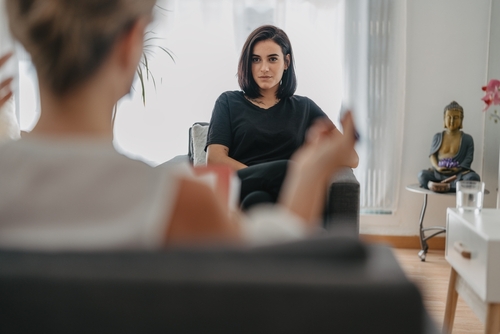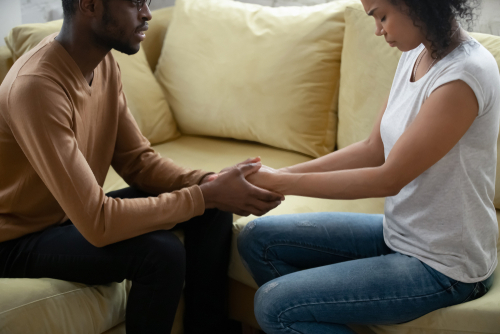Many people try to numb or hide their vulnerability, to push it down and pretend it doesn’t exist. It’s no wonder that misconceptions about it are so widespread. Many people fear being vulnerable; sometimes, they’re ashamed of showing they need help, or they don’t like asking for it, to avoid the possibility of being turned down. Some will spend most of their lives living like this and pushing down all the scary or unpleasant emotions. However, not taking risks usually means missing the chance to experience joy, happiness, and love.
Avoiding vulnerability at all costs can lead to unhealthy behavior patterns and coping mechanisms like discharging pain by placing blame on others, pretending that our actions don’t affect other people, or turning the dissatisfaction toward ourselves and developing poor self-image and low self-esteem. Alternatively, if we take a chance, start listening to our emotions and allow ourselves to be seen by others as we truly are, this change of behavior can lead us to learn to truly listen and hear others too and become gentler to people around us.
Taking these steps and receiving positive reactions from others connects vulnerability and trust. It can help us feel gratitude, learn to love ourselves as we are, and bravely step out into the light with all our imperfections.

What Are Some Common Misconceptions Concerning Vulnerability?
If each of us keeps hiding our vulnerability from others and avoiding to acknowledge it, let alone talk about it, we may fall into one of the traps and common misconceptions that are perpetuated by the silence:
- Vulnerability is a weakness. Most western societies perpetuate the ideal of strength at any cost, and many of us have been taught that keeping our emotions to ourselves and projecting a picture of strength is mature behavior. Despite widespread cultural myths, vulnerability is not a weakness. In fact, sharing our emotions is very courageous, as it requires risk and inner strength.
- I am not vulnerable. Some of us may be putting up a bulletproof façade and maintaining an image of strong, independent, fearless individuals. This is also the result of fear and another myth – it’s easier to say we don’t need vulnerability in our lives than to expose ourselves to being hurt.
- Vulnerability is scary and uncomfortable. Being vulnerable means taking a risk, and that can certainly feel uncomfortable and scary. However, it’s not necessarily a negative thing. Instead, it’s our chance to grow and deepen relationships with people in our lives.
Besides, vulnerability doesn’t include only dark emotions and bad memories. It can involve all kinds of emotions, no matter how big or small, and some of them can be related to common everyday events.
- You need trust to be vulnerable. It is often said that trust is the condition that makes it possible to open up and be vulnerable in front of someone. However, this is often false, as the possibility of connection exists in any type of genuine human interaction. It’s great when trust and vulnerability go hand in hand, yet one doesn’t guarantee the other.
- Only certain people are vulnerable. It’s a common misconception that certain people are vulnerable while others aren’t. This kind of thinking can even be damaging since it might make some people feel excluded, and the feeling of belonging is one of the most vital human needs. Being vulnerable is necessary and possible for everyone.
- Vulnerability means full disclosure. There is a clear distinction between vulnerability and full disclosure. Even though vulnerability does mean sharing a part of yourself with others, it doesn’t mean sharing absolutely everything with the world and revealing every single little detail or secret you ever had. We call this, transparency with discernment!
Vulnerability is self-awareness and social awareness as well. Knowing what’s appropriate to share and what isn’t, particularly when forming new connections with people, is essential for understanding the core principles of becoming vulnerable.
- We can deal with everything on our own. Some people might go through most of their lives thinking that they don’t need to be vulnerable because they’re self-sufficient and there’s no need to express their feelings to others as they can deal with them on their own.
This can lead to loneliness and robbing yourself of feelings of connection and belonging. The strength people derive from the collective and the ability to communicate, plan, and work together is irreplaceable. People are biologically predisposed to depend on each other.
Is Vulnerability A Strength Or A Weakness?
Mental health professionals and therapists agree that vulnerability is definitely not a weakness. It might be easy or common to think so, particularly if we haven’t had a good role model or were influenced by inadequate parenting or distressing early life experiences. Some of us might have become scared of being vulnerable later in life after having gone through certain disappointments that made us overly cautious.
The feeling of shame and fear of failure are commonly associated with a tendency to isolate ourselves and hide our sincere feelings, thoughts, and needs from others. However, even though being vulnerable and showing it exposes us to great emotional risk and uncertainty, it has a very significant adaptive role. Finding the courage to be honest can lead to unexpected new experiences, changes, creativity, and innovation.
By surrendering to vulnerability and letting our guard down, we can finally allow ourselves to be truly seen as we are and feel accepted and loved for it. The feeling of not being worthy can slowly dissipate, and we can begin to form stronger and more meaningful connections. When we’re loved for who we truly are, we can finally experience a powerful sense of belonging and worthiness. However wonderful it feels to be accepted and loved by others, it’s even more important that we ourselves believe we’re worthy and loveable.
How Can I Begin To Appreciate My Vulnerability?
Learning to appreciate your vulnerability, despite viewing it as being a challenging process, is the best way to begin leaning into vulnerability. Trying to stifle it usually leads to feelings of low self-esteem, shame, loneliness, isolation, and, quite often, even deeper issues like depression and anxiety. No matter how hard we try to avoid it, we’re all vulnerable. That’s the way we’re born, and the only choice we have about it is how we’re going to shape those feelings. We get to decide if we’re going to make the most of them.
One of the main benefits of vulnerability is certainly empathy. Empathy helps us connect with other people by being able to understand how they feel because we understand how we feel. All human feelings, good or bad, are quite universal. Forming strong, open, deep connections with friends, family, or romantic partners is what makes embracing our vulnerability worthwhile.
If we manage to overcome our fear of failure, we’ll realize that vulnerability is essential for learning. Making mistakes, accepting them, and learning from them can lead to personal growth. By accepting that we’re not perfect and that there’s nothing wrong with that, we also accept that others aren’t either and that they also make mistakes and deserve to be forgiven and understood. This acceptance is a valuable opportunity for spiritual and emotional growth.

How To Build Trust And Connection By Accepting And Appreciating Your Vulnerability
Accepting vulnerability leads to forming more vital and more profound connections, both with our true selves and with other people in our lives. If you’re unsure where to start, PIVOT’s experienced coaches can guide you through this rewarding process step by step. Struggling with vulnerability expands our perception by teaching us to work on our flaws while risking judgment. Fighting the fear of being ridiculed or shamed helps us realize that, even though imperfect, we are worthy of love.
Immerse yourself in a life-changing experience of one of our Glass House retreats. Our intimate group workshops can help you brave through the fear. We can solidify our strengths and change how we perceive ourselves and others. As a result, we can grow both professionally and privately and become better friends, parents, and romantic partners.